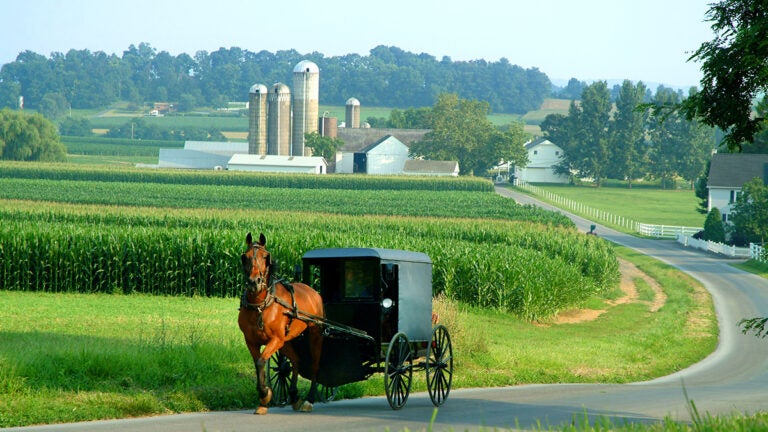
New faculty member found a bit of Buddhist China in the heart of Amish Country
One day, homesick for China, Jessica Zu went to an Amish farmer’s market near her home in central Pennsylvania. Having an affinity for Pennsylvania Dutch food — pickled vegetables, sauerkraut, molasses-based pies — she did some shopping and returned home. Tasting a bit of her newly bought raw milk yogurt, she was transported back to her childhood.
“My mom was of Mongolian heritage, so she used to make her own yogurt at home, and I never learned how to make it. I was homesick, but the one jar of yogurt from the Amish people cured me. It tasted so much like home; it was so good,” said Zu, assistant professor of religion at the USC Dornsife College of Letters, Arts and Sciences.
According to Zu, Amish food was the major factor deciding where she would settle in central Pennsylvania. But there are other similarities between the Amish way of life and that of Pure Land Buddhism, of which she is a practitioner.
“Some forms of Buddhism require to you to be facing home and not to have too much stuff. If I were to have stayed in China and continued my Pure Land practice, my life would be like theirs, the Amish,” she noted.
Zu grew up in Beijing, China, in a family that practiced Pure Land Buddhism. She originally came to the United States to study science, earning a Ph.D. in physics from Pennsylvania State University along the way. However, frustrated that “our brains cannot effectively process facts” in the same way computers can, she decided to pursue additional studies in a field that focused more on making sense of the world through narrative chronicling.
“Religions, especially Buddhism, have mastered diverse storytelling strategies to enable us to live peacefully together. I studied Buddhism to better understand how we could live together in harmony on this lonely planet,” Zu said. She went on to earn her doctorate in religious studies from Princeton University, and today her work focuses on modern Buddhism and its role in social justice.
“I think that in contemporary scholarship hardly anyone pays attention to how Buddhism was used as a way of justifying social equality, freedom and democracy. I call that ‘Buddhist social consciousness,’” she said.
In fact, the civil rights movement and other social justice efforts of the 1960s gave rise to engaged Buddhism in North America, Zu said. Many Buddhist practitioners continue to make it accessible and relevant by developing new doctrines such as racial karma, environmental karma and collective suffering (known to Buddhists as “dukkha”).
The internet has made it easier for Buddhist messages to proliferate, as laypeople, not monks, can spread Buddhist teachings. However, the faith has undergone some recent changes, with the “mindfulness movement” and other groups focusing on a few select, more superficial, aspects of it.
“The mindfulness movement is more about psychologizing Buddhism and reducing the complex social movements by saying, ‘Just go meditate and your problems will be solved.’ It’s useful because everyone needs inner peace, but I think engaged Buddhism is what is picking up in North America,” she said.
Politically and socially engaged Buddhism has much to teach the U.S., Zu said, and its doctrines advocate the sorts of principles the country claims to hold dear, including democracy, compassion, human rights and social equality. However, it will take a great effort, both individually and socially, for the country and its people to properly employ these tenets in creating a fairer society.
That effort, Zu explained, comes with a change from a mindset that centers the self to one that recognizes the interconnectedness of all creatures, whether humans, livestock or plants.
The Buddhist concept of “no-self,” for example, is meant to prompt reflection on what a self — both physically and psychologically — truly is, and why our bodies and even our identities, whether as part of a group, a nation or something else, need protection through laws that encourage the use of violent force against others.
The Buddhist tenet of impermanence carries similar connotations: What is “property,” to be so central to our society that its ownership is inscribed into laws?
Finally, the Buddhist idea of dependent origination comes from the idea that every living being is a process within a network of mutual influences, one in which the individual is inseparable from the collective: Only through careful, mindful actions toward other living things, including livestock, plants and even the tiniest of insects, can both individual freedom and collective well-being flourish.
And that, Zu says, is truly a lesson for our time.